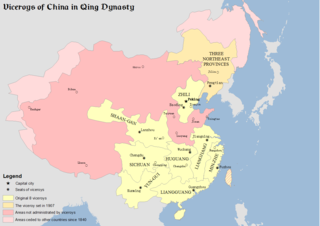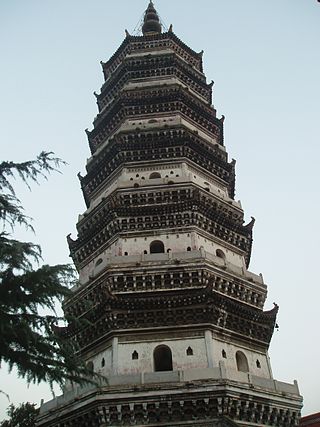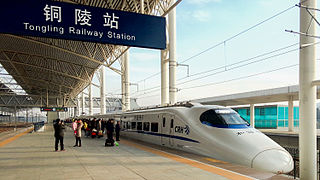Related Research Articles

Anhui, is a landlocked province of the People's Republic of China, part of the East China region. Its provincial capital and largest city is Hefei. The province is located across the basins of the Yangtze River and the Huai River, bordering Jiangsu to the east, Zhejiang to the southeast, Jiangxi to the south, Hubei to the southwest, Henan to the northwest, and Shandong for a short section in the north.

Hefei is the capital and largest city of Anhui Province, People's Republic of China. A prefecture-level city, it is the political, economic, and cultural center of Anhui. Its population was 9,369,881 as of the 2020 census and its built-up area made up of four urban districts plus Feidong, Feixi and Changfeng counties being urbanized, was home to 7,754,481 inhabitants. Located in the central portion of the province, it borders Huainan to the north, Chuzhou to the northeast, Wuhu to the southeast, Tongling to the south, Anqing to the southwest and Lu'an to the west. A natural hub of communications, Hefei is situated to the north of Chao Lake and stands on a low saddle crossing the northeastern extension of the Dabie Mountains, which forms the divide between the Huai and Yangtze rivers.

Tongling is a prefecture-level city in southern Anhui province. A river port along the Yangtze River, Tongling borders Wuhu to the east, Chizhou to the southwest and Anqing to the west.

Anhui University, colloquially known in Chinese as An Da, is located in Hefei, the capital city of Anhui Province, China. Founded in 1928 in Anqing, named 'National Anhui University' in 1946 and moved to Hefei in 1958, Anhui University is supported by the government under the Double First Class University Plan and Project 211. It is a Chinese state Double First Class University recognized by the Ministry of Education of China. The university currently has approximately 27,000 students and 2500 staff including 1522 faculty members. Consisting of 14 colleges, Anhui University's broad-based education covers philosophy, economics, law, literature, history, science, engineering and management. Its motto is 'honest, resolute, erudite, discreet'. For the past 80 years Anhui University has provided higher education in fundamental knowledge, professional skills, social responsibility and innovative concepts. On its 80th anniversary the university hosted the 7th Forum of Presidents from Asian Universities. In 2015 the university purchased the Anhui University Bamboo Strips which is a collection of Warring States manuscripts currently under publication.

Anqing is a prefecture-level city in the southwest of Anhui province, People's Republic of China. Its population was 4,165,284 as of the 2020 census, with 804,493 living in the built-up area made up of three urban districts. Anqing is famous as the birthplace of Chen Duxiu, one of the founding fathers of the Chinese Communist Party, who served as the first General Secretary of the Chinese Communist Party from 1921 to 1928.

Chizhou is a prefecture-level city in the south of Anhui province, China. It borders Anqing to the northwest, Tongling and Wuhu to the northeast, Xuancheng to the east, Huangshan to the southeast, and the province of Jiangxi to the southwest. Its population was 1,342,764 as of the 2020 census whom 615,274 lived in the built-up area made of Guichi District. Mount Jiuhua (Jǐuhuáshān), located in Qingyang county, is one of the four sacred mountains of Chinese buddhism.

Huangmei or Huangmei tone originated as a form of rural folk song and dance that has been in existence for the last 200 years and possibly longer. Huangmei opera is one of the most famous and mainstream opera in China. The original Huangmei opera was sung by women when they were picking tea, and the opera was called the Picking Tea Song. In the late Qing dynasty, the songs came into Anhui Province— Huaining County adjacent regions, combined with the local folk art, Anqing dialect with singing and chants, and gradually developed into a newborn's operas. The music is performed with a pitch that hits high and stays high for the duration of the song. It is unique in the sense that it does not sound like the typical rhythmic Chinese opera. In the 1960s Hong Kong counted the style as much as an opera as it was a music genre. Today it is more of a traditional performance art with efforts of revival in mainland China, Hong Kong, and Taiwan, and mostly sung in Mandarin.

The Viceroy of Liangjiang or Viceroy of the Two Jiangs, fully referred to in Chinese as the Governor-General of the Two Yangtze Provinces and Surrounding Areas Overseeing Military Affairs, Provisions and Funds, Manager of Waterways, Director of Civil Affairs, was one of eight regional Viceroys in China proper during the Qing dynasty. The Viceroy of Liangjiang had jurisdiction over Jiangsu, Jiangxi and Anhui provinces. Because Jiangsu and Anhui were previously part of a single province, Jiangnan, they were thus known, along with Jiangxi, as the two jiangs, hence the name "Liangjiang".
Anqing Normal University , it is an undergraduate normal university in Anhui Province, located in Anqing City, Anhui Province, China.

Anhui Normal University is an institution of higher learning in Wuhu, Anhui Province, China.

The Zhenfeng Pagoda in Anqing City, Anhui Province, People's Republic of China, is a Buddhist pagoda originally built in 1570 during the Ming Dynasty. Due to its location near a bend in the Yangtze River, the pagoda was formerly used as a lighthouse, and contains niches for lanterns. After construction, the pagoda was initially called the "Ten-thousand Buddha" (万佛塔) pagoda due to its interior containing over six hundred Buddha statues.

Anqing Tianzhushan Airport is a dual-use military and civil airport serving the city of Anqing in Anhui Province, China. It is located 6.3 kilometers (3.9 mi) north of the city. In 1991 the national government approved the conversion of the military Anqing Air Base to a dual-use airport. With an investment of 28 million yuan, the airport was opened to civil flights in December 1993. In 2005 HNA Group took over the management of the airport and renamed it Anqing Tianzhushan Airport, after the nearby tourist destination Tianzhushan.
Chaohu Prison is a prison in Chaohu, Anhui, China. It was established in 1959. It is the province's 3rd largest prison currently employing over 1200 guards and other employees. Most of the inmates here are sentenced to life or serving commuted death sentences. The factory was established in 1959 and is a national key enterprise in the machinery industry. It is also a special enterprise designated by the Ministry of Railways to produce railway parts. Products made here are used in all railway engineering departments throughout China.
The Hefei–Anqing Expressway, commonly referred to as the He'an Expressway is an expressway that connects Hefei, Anhui, China and Anqing, Anhui. It is a spur of G42 Shanghai–Chengdu Expressway and is completely in Anhui Province.

The Nanjing–Anqing intercity railway is a high-speed rail, passenger-dedicated line between cities of Nanjing, Jiangsu Province and Anqing, Anhui Province, in China. Construction of the 258-kilometre (160 mi) railway began in January 2010, and the line was opened on 6 December 2015.

Xu Wenli, is from Anqing, located in the Southeastern province of Anhui, China. As one of the leaders of the China Democracy Party, Xu organized and participated in the Democracy Wall movement and acted as the chief editor for the journal April Fifth Forum. Xu was twice arrested by the Chinese government and sentenced to a total of 28 years in jail, of which he served 16. After his exile to the United States on 24 December 2002, Xu received an honorary doctorate degree from Brown University, and has since worked at the university's Watson Institute for International and Public Affairs as a senior research fellow.
Han Xiancong is a former Chinese politician from Anhui province. He was best known for his term as the Communist Party Secretary of the cities of Anqing and Chuzhou. From 2013 to 2014 he served as the vice-chairman of the Anhui provincial People's Political Consultative Conference, a largely ceremonial legislative consultation body. He was later investigated for corruption and indicted on criminal charges of bribery.

The Battle of Anqing (安慶之戰) was a prolonged siege of the prefecture-level city of Anqing in Anhui, China, initiated by Hunan Army forces loyal to the Qing Dynasty against the armies of the Taiping Heavenly Kingdom. The siege began in September 1860 and ended on September 5, 1861, when imperial forces under the command of Zeng Guoquan breached the walls of the city and occupied it.
RATP Dev Asia is a subsidiary of RATP Dev that operates public transport services in Asia. It was previously the RATP Dev Transdev Asia (RDTA), a 50/50 joint venture owned by RATP Dev and Transdev until October 2020.
Li Yihuang is a former Chinese politician and entrepreneur. He was the Vice Governor of Jiangxi and the President of Jiangxi Copper. On January 17, 2018, Li Yihuang was placed under investigation by the Communist Party's anti-corruption agency.